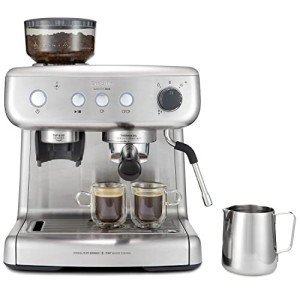The Top 5 Reasons People Thrive In The Home Use Espresso Machines Industry
Home Use Espresso Machines: A Comprehensive Guide
Espresso machines have actually ended up being a staple in numerous homes as coffee enthusiasts look for to replicate café-quality brews in the comfort of their kitchen areas. The increase in popularity has actually resulted in a diverse market filled with numerous designs, features, and costs. This article aims to provide a useful summary of home use espresso machines, assisting readers navigate their choices efficiently.
Comprehending Espresso Machines
Espresso machines work by requiring hot water through finely-ground coffee under high pressure, resulting in a concentrated coffee drink referred to as espresso. There are a number of kinds of espresso machines categorized based on their brewing methods and level of automation. The most common types include:
Manual Espresso Machines: These require the user to control the pressure and water flow, enabling for a more hands-on coffee-making experience.
Semi-Automatic Espresso Machines: These use automatic control over water pressure, while the user manually grinds and tamps the coffee.
Automatic Espresso Machines: With the push of a button, these machines instantly manage the circulation of water, making it much easier to brew espresso with consistent results.
Super-Automatic Espresso Machines: These all-in-one machines deal with grinding, tampering, developing, and even milk frothing, making them perfect for users searching for benefit.
Pill or Pod Machines: These use pre-packaged coffee pods to produce espresso with very little effort, but they limit choice in brewing methods and flavors.
Table: Comparison of Espresso Machine Types
Type
Control Level
Relieve of Use
Cleaning Level
Perfect For
Manual
User-controlled
Moderate
High
Coffee perfectionists
Semi-Automatic
Partial automation
Moderate
Moderate
Home baristas
Automatic
Fully automated
Easy
Low
Busy individuals
Super-Automatic
Fully automated
Really simple
Extremely low
Convenience hunters
Capsule/Pod
Totally automated
Extremely easy
Extremely low
Casual drinkers
Key Features to Consider
When selecting a home use espresso machine, it's vital to consider numerous functions that can considerably impact the quality of espresso and user experience.
Pressure: Look for machines that supply at least 9 bars of pressure, as this is considered ideal for brewing espresso.
Boiler Systems: Single vs. dual boiler systems identify temperature stability and the capability to brew espresso and steam milk concurrently.
Grinder: Integrated mills enable freshly ground coffee, which improves flavor. Think about click the following post with adjustable grind settings.
Milk Frother: For those who enjoy cappuccinos and lattes, a built-in steam wand or automatic frother is important.
Size and Design: Consider your kitchen area space and visual choices. Machines come in different sizes, from compact to big setups.
Rate: Home espresso machines can range from a couple of hundred to a number of thousand dollars, so it's essential to establish a budget before exploring options.
Advantages and disadvantages of Home Use Espresso Machines
Pros
Cons
Convenience of brewing coffee in the house
Preliminary financial investment can be high
Quality of espresso is typically superior
Requires some skill, specifically with manual machines
Capability to explore tastes
Upkeep and cleaning can be labor-intensive
Can conserve money in the long run
Not all machines will suit every coffee preference
Maintenance and Cleaning Tips
Maintaining an espresso machine is important for lengthening its life and making sure constant brew quality. Here are some helpful tips:
Regular Descaling: Minerals from water can develop up in the machine. Descale every 1-3 months, depending on water hardness.
Daily Cleaning: Rinse portafilters, baskets, and steam wands after each use to avoid coffee oils from constructing residue.
Use Filtered Water: This can help lower mineral accumulation and improve the taste of coffee.
Change Gaskets and Seals: These elements might wear with time and should be changed to preserve pressure and efficiency.
Check out the Manual: Each machine has specific care guidelines; following these will ensure longevity.
FAQs About Home Use Espresso Machines
**Q1: What is the best budget espresso machine?The best budget espresso machine often depends on individual needs, however designs like the DeLonghi EC155 or the Breville Bambino are popular among users for offering great value. Q2: How long do home espresso machines usually last?With appropriate upkeep, home espresso machines can last anywhere from 5 to 15 years, depending upon the quality of the machine and frequency of use. Q3: Can I make coffees and lattes with any espresso machine?While most espresso machines can make cappuccinos and lattes, having a trusted
steam wand or frother is important for accomplishing the ideal milk texture.
Q4: Are super-automatic machines worth the investment?For those who focus on benefit and quick developing, super-automatic machines can be worth the investment, though they might do not have some customizability in brew strength and flavor. Q5: What types of coffee beans are best for espresso?While individual choice plays a function, beans identified as” espresso “blends are generally roasted darker, developing abundant flavors and a creamy texture when brewed.
Purchasing a home espresso machine can change the day-to-day coffee regimen into something special, raising home brews to café quality. By comprehending the various types of machines, essential features to think about, upkeep requirements, and weighing the
pros and cons, customers can make educated decisions that fit their individual preferences. As right here continues to grow, no matter the choice, every brew can be a scrumptious experience waiting to be savored.  **
**